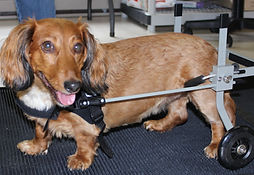
Appalachian Canine Therapy LLC

ACTNOWK9
Mission
Many people are demanding state of the art and scientifically based treatment for their animals - just as they would for themselves. There are higher expectations of the treatment to improve the quality of their animals' lives and ensure overall function, health and longevity.
Physical therapy is a vital part of helping people recover from injury, surgery and illness. Just as with human patients, animals can benefit tremendously from physical rehabilitation services. Rehabilitation therapy can greatly help with post surgical healing, injury prevention and strengthening athletic and companion animals. It can be used to help prevent future tendon and ligament injuries, and benefit overall physical health.
In addition it can greatly improve the quality of life for older or arthritic patients with degenerate conditions. Studies have shown that the use of rehabilitative therapy not only improves the patient's recovery time and quality of life but also benefits the patient-owner bond as the owner is helping in the patient's recovery and strengthening.
Benefits of Physical Rehabilitation:
-
Improves circulation which accelerates healing
-
Increases muscle mass and strength which improves balance and coordination
-
Improves joint and soft tissue flexibility and mobility which increases ability to perform daily activities
-
Minimizes or eliminates pain which may improve quality of life
-
Increases speed of recovery
-
Enhances the ability to perform daily activities
Meet Cindy Smily Kolb, PT, DPT, CCRT
Appalachian Canine Therapy was created not only as a result of a legitimate and growing need for professional services in the field of canine rehab, but also due to a personal need to have strong and healthy working dogs on our farm, Syncope Falls.
We realized the need, as a farm with rolling mountain acres, to have working dogs at their top/optimal level of performance.
Here, at Syncope Falls Farm, we are extremely fortunate to depend on the skills of our 5 Bulgarian Karakachan Livestock Guardian Dogs to protect our flocks and herds. The Karakachans are gaining great popularity in the United States. As American ambassadors for these dogs, we felt it was necessary to have a comprehensive understanding of their physical needs in every stage of their life to ensure their longevity, peak performance and happiness.
Fortunately, the field of canine rehab is the fastest growing area in veterinary medicine at this time. Its importance is recognized by the veterinary community and the American Physical Therapy Association and is open to Physical Therapists and Veterinarians alike.
Due to many requests from veterinarians, and given the training Cindy has received, the benefits of canine rehab can also be applied to benefit felines and other animals, and Cindy is accepting these as patients as well.
With 20+years experience as a licensed and practicing Physical Therapist, Cindy has a great understanding of the benefits of physical therapy and will apply these to the benefit of your canine. Cindy graduated from James Madison University with a Bachelors of Science in Health Science Fitness & Promotions in 1994. In 1996, she completed her Masters in Physical Therapy from Old Dominion University. During her graduate program, she interned in a variety of well known physical therapy centers, such as the University of Virginia Medical Center's Adult Rehab Center and the Tuba City Indian Medical Center on the Navajo Reservation in Arizona. In 2018, she completed her Doctorate of Physical Therapy degree from the college of St. Scholastica.
Cindy worked as a Physical Therapist in the Bristol Regional Medical Center in Bristol, Tennessee, overseeing a full case load involving orthopedic, neurologic, cardio pulmonary, wound-care and pediatric patients. After moving back to Virginia, Cindy decided to work in the field of home health in the New River Valley overseeing plan of care development for a variety of patients in various settings. In 2011, Cindy decided to combine her love of dogs with her passion for physical therapy and in 2012 earned her certification as a canine rehabilitation therapist through the leading U.S. school in this field - the Canine Rehabilitation Institute. Cindy is a member of the American Physical Therapy Association and the Virginia Physical Therapy Association as Liasion to the Special Interest Group for Canine Rehab.
She is pleased to offer for your animal companion treatment on a range of exercise equipment, proprioceptive training (for balance), modalities, and most importantly skilled manual techniques. As a Physical Therapist, she understands that it is not enough to treat the signs/symptoms of a problem. The physical dysfunction causing the symptoms must be addressed by skilled hands in order to successfully treat the patient.


Conditions Treated in Physical Rehabilitation:
-
Arthritis/Degenerative Joint Diseases
-
Hip and elbow Dysplasia
-
Post-operative recovery from:
Laminectomy
Cruciate surgery (TPLO, TTA)
Femoral Head Osteotomy
Total Joint Replacement
-
Non-surgical care for:
Cruciate Tears, Patella Luxation
Weakness from illness
-
Vestibular/balance dysfunction
-
Musculoskeletal pain
-
Tendinopathy
-
Amputations
-
Loss of function related to cancer
-
Intervertebral Disc Disease (IVDD)
-
Neurologic conditions
-
Degenerative myelopathy
-
Fibrocartilagenous Embolism (FCE)
-
Traumatic injuries
-
Cauda Equina Syndrome
-
Spondylosis
-
Sports injuries
-
Obesity
-
Wounds

Collaboration with Your Veterinarian
Our fitness evaluations are not intended to replace regular veterinarian care and examination. If your animal is lame, has been injured, or has had a recent surgery, you must see your veterinarian first in order to obtain a referral prior to receiving our services.
If concerns arise during treatment regarding orthopaedic or neurologic issues, we will contact your veterinarian and make them aware of this issue in order to see what course of action needs to be taken.
Our goal is to keep your animal at their optimal level of health.
At Appalachian Canine Therapy, we enjoy working in close collaboration with members of the veterinarian profession in order to complement your animal's veterinary care.
Your veterinarian will receive a full evaluation of our findings on your pet along with a treatment plan, your pet’s progress, and a full discharge summary.

